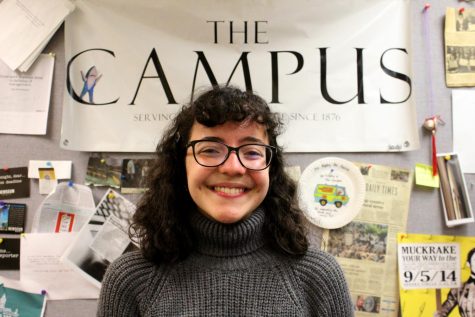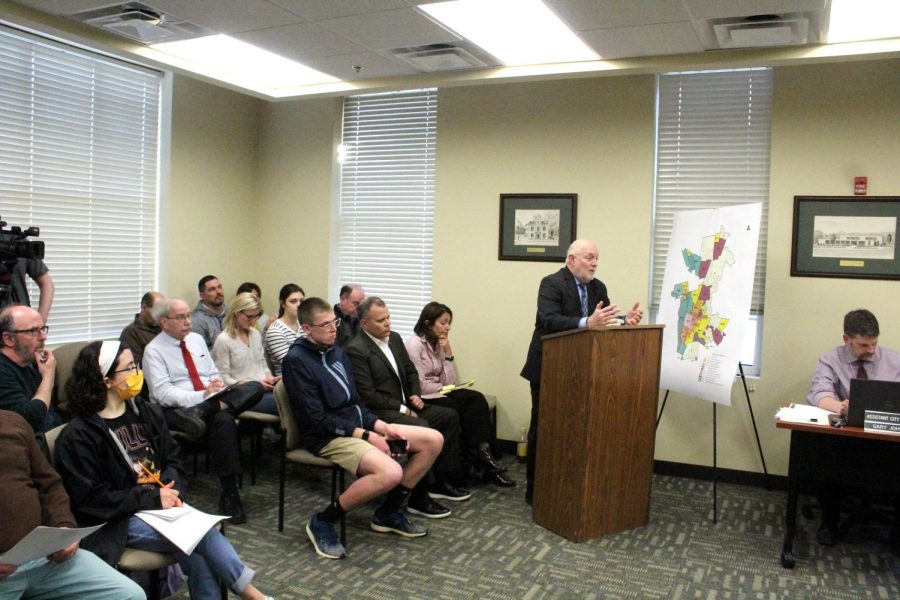College bid for Meadville city liquor license tabled by City Council
First on the Meadville City Council’s agenda during its convening on Thursday, April 21, was a public hearing regarding the proposed transfer of a liquor license from West Mead Township to the city of Meadville, specifically to the Allegheny College campus.
The meeting was called to order at 5:32 p.m. in the Meadville City Building.
Representing the college was Attorney Mark Kozar of Flaherty & O’Hara, a firm in Pittsburgh that specializes in liquor licensing.
In the hearing, Kozar provided some introductory information from the liquor code, explaining that it allows the Professional Licensing and Certification Division to approve the transfer of liquor licenses between two Crawford County municipalities provided that the municipality on the receiving end passed a resolution approving the transfer.
“But what you probably don’t know is that the legislation passed a substantial revision to the liquor code by way of Act 39 in 2016,” Kozar said. “Therein, the legislature stated, ‘In order to adapt to the changing marketplaces, this act will provide for the operation of the retail system that promotes competition and convenience.’”
The “changing marketplaces” refers to establishments aside from state liquor stores, like convenience shops, obtaining liquor licenses. Kozar further explained that with the Act 39 revision, those in the marketplace were encouraged to be competitive, in part because competition would lower prices.
When the college came to Flaherty & O’Hara interested in acquiring a liquor license, there were no liquor licenses for purchase in Meadville. As of now, six licenses in Crawford County are in safekeeping, according to Kazar, meaning they have been put away because the business that had them no longer has use for them. These licenses may be available for sale.
A college campus with its own liquor license is not a new phenomenon, as Kozar pointed out. Similar institutions such as Mercyhurst and Duquesne have one each, and the University of Pittsburgh and Robert Morris University have two.
Kozar proceeded to welcome President Hilary Link to the podium to offer further insight as to why Allegheny was seeking this license.
“Allegheny College, like every college campus, is really struggling in the post-COVID era to recreate a sense of community on campus,” Link said.
The college is also currently experiencing financial and retention struggles, according to Link, which is another reason that it is applying for a liquor license. Link noted that keeping the community “vibrant” may lead to better retention of students. She proceeded to say that students have repeatedly indicated an interest in having a place to gather on campus after the bars downtown have closed.
Link pointed to the liquor sales at football and basketball games as examples of the college’s borrowing liquor licenses already. The result, she stated, has been a positive on-campus atmosphere.
“All of our athletic teams, for example, will say that it has completely changed the way that they perform because of the support of larger crowds that are enthusiastic, excited to be there,” Link said.
Moreover, the institutions that Allegheny competes with and that Allegheny students tend to transfer to, such as DePaul University and Denison University, possess a liquor license on campus. Link implied that obtaining a license as well would give the college a competitive edge.
Allegheny does not envision creating a pub or a restaurant, Link said, but rather installing beer and wine taps in McKinley’s Food Court.
After Link’s presentation, Kozar turned the proverbial microphone to the city council to ask questions.
Councilman James Roha, an Allegheny alumnus, commented on what he perceived as the “180-degree paradigm shift” that Allegheny was undertaking.
“My fraternity was ejected from campus, along with some other ones,” Roha said. “There was a concerted effort to eliminate alcohol from the campus.”
Link responded by differentiating between the unregulated drinking that occurs in fraternity houses and the drinking that the college has been able to oversee with the Sycamore pop-up pub and other events. At the Sycamore, a communal place where students and faculty alike can enjoy alcohol, attendees must show their IDs, and their drinking is monitored.
“It’s not that there’s a 180-degree change at all,” Link said, “but we haven’t previously had the opportunity to offer alcohol in a safe and controlled environment, like this would enable us to do.”
Meadville Mayor Jaime Kinder wondered if the acquisition of the license would result in more residents of Meadville coming to campus, and how Allegheny would handle safety as a result.
Given the options for drinking in town, Link did not foresee a great many off-campus community members coming to McKinley’s. In addition, she said, with Public Safety and checking student IDs and carding, “the plan is for this to be relatively controlled.”
Link pointed out, in answering a question asked by Councilwoman Gretchen Myers, that complications and limitations exist with borrowing liquor licenses under Parkhurst, which have further motivated the college to seek its own license.
Deputy Mayor Larry McKnight asked why Allegheny did not wish to continue to make use of its current resources, or have a Crawford Area Transport Authority bus take students to Meadville bars, as was the case in the past. He saw a discrepancy between the intent of building community would and the impact of having a communal space for drinking on campus.
“In a way, it seems like it’s going to separate, because you have the college up here and the locals downtown,” McKnight said.
Link replied that some students do not feel comfortable leaving campus, and that the students who enjoy going to bars in town will continue to do so.
Constituents were invited to come up to the podium for public comment following the questions period. All three constituents expressed strong dissent.
As a designated driver on multiple occasions for multiple people, Meadville resident Ron Irwin found fault in a claim made by Kozar earlier that not all bars close at two in the morning. Kozar, who had stated that a restaurant liquor license restricts the sale of alcohol from 2-7:00 a.m., had been responding to a comment made by Councilwoman Autumn Vogel regarding if students really would have a place to drink after bars downtown close.
“Every time in my life, last call happens about quarter to two, no matter what anybody else tells you,” Irwin said, gesturing to Kozar.
In Irwin’s view, alcohol does not help facilitate learning, and the point of college is to learn. He also said that serving liquor on campus would be a problem considering there is a daycare in the Oddfellows building.
Jim Barko has called Meadville home for 60 years. One day, a party at a college house next door to his got out of control, and students were fighting. Barko, who had recently returned from the hospital, had told them to keep off his property.
“Next thing, they’re fighting in the driveway, bouncing off the house,” Barko said.
One student punched his window. Barko came out with a shotgun, which ended the party.
The next day, Barko found a stove and phones in his driveway, and front and back doors were lying flat.
Ron Gebhardt, along with his wife, has owned Chipper’s Pub downtown for 16 years. He estimates that this liquor license would take away 30% of his annual business.
“When (students) come down into my establishment, we keep an eye on them,” Gebhardt said. “We make sure they get home safe, don’t get served too much. You know, it’s (a) fine line. It’s hard to do. But … we do our very best.”
After public comments concluded, McKnight asked why students of legal drinking age cannot go to the state store and purchase alcohol for themselves.
Link responded by saying that in having a communal drinking space, “we’re actually teaching (students) more responsible ways of drinking and socializing” than fraternity alcohol consumption or the binge drinking that Barko had described.
The hearing ended at 6:09 p.m.
During the regular city council meeting, the council voted unanimously to table the discussion of a liquor license for Allegheny.

Sofia Hassan is a second-year student from New Castle, Pennsylvania. She plans to major in English Creative Writing and minor in Middle East and North...

Sami Mirza is a senior from many different places. He is majoring in International Studies with a focus on the Middle East and North Africa and minor in...









